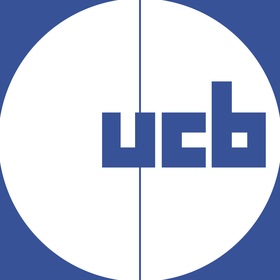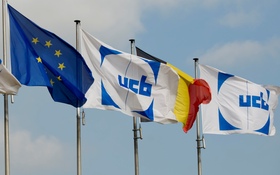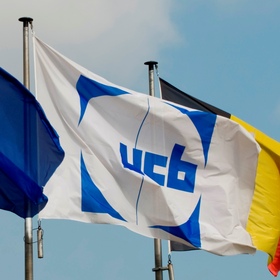UCB is becoming a patient-centric biopharma leader
Naar de Nederlandstalige versie
Vers la version en français
Brussels (Belgium), April 28, 2011 – Today, UCB held its Annual General Meeting (AGM). During the course of this meeting Roch Doliveux, Chief Executive Officer UCB, gave the shareholders of UCB an overview of the financial year 2010 and the interim report for the first three months of 2011.
" If 2009 was an exceptional year for UCB in terms of approvals and drug launches then 2010 was a year of confirmation of our strategic choices. Our strategy has remained the same for the last seven years: namely to transform UCB into a global biopharmaceutical leader that places the patient at the centre of its activities while specialising in the serious diseases of the central nervous and immune systems.
2010 saw all of the pieces of the puzzle fitting together for the first time and today we have every reason to be confident. Our financial results have surpassed expectations. Shortly after their launch, our three new core medicines – Cimzia®, Vimpat® and Neupro® – are making advances that permit us to hope for the best. By the end of 2010 more than 200,000 patients – twice the number of patients treated the previous year – had already benefited from these new UCB medicines in more than 20 countries throughout the world. Our pipeline was also substantially reinforced. Major new research projects were born; and our new medicines in clinical development phases have also progressed. In 2010 UCB also strengthened its ties with choice partners in a variety of fields, thus consolidating its ‘open innovation’ model, which is beginning to bear fruit.
Today, UCB enters its final phase of transformation. The last wave of expiring patents is scheduled for 2011. This is notably the case for Keppra® in Europe which is already facing generic competition in Germany. The impact of this last wave of expiring patents will be partially offset by the growth of Cimzia®, Vimpat® and Neupro®, as well as our mature products in emerging countries and Japan. Beyond 2011, UCB will see a period of 10 years without any patent expiries. We also expect additional growth in our pipeline medicines which should have successfully passed through clinical development and received the necessary authorisations. The foundations of UCB’s success have been laid and are solid.
2010 results
Our total revenue surpassed forecast for 2010 – increasing by three percent to reach a total of 3.2 billion Euros. We succeeded in doing so due to the sales growth of our three new medicines and solid performance of our mature products. These include Keppra® in Europe and in the rest of the world (particularly with the launch of E Keppra® in Japan), and the sales of venlafaxine XR in North America. Our company is showing strong performance with a recurring EBITDA of EUR 731 million, up by five percent.
Let us focus for a moment on the performances of our most important medicines. Cimzia®, Vimpat® and Neupro® are growing rapidly and have generated combined sales of 413 million Euros in 2010, and this after an initial year of marketing in the United States and Europe. Cimzia®, indicated in the treatment of rheumatoid arthritis in the United States and Europe and in the treatment of Crohn´s disease, in the United States and Switzerland, generated net sales of EUR 198 million Euros in 2010 (an increase of 163 percent in a single year). The deployment of Cimzia® continues. More than 22,000 patients across the world had been treated with this drug by the end of 2010. Vimpat®, our new anti-epileptic drug, achieved net sales of 133 million Euros in 2010 (that’s a growth of 190 percent) and has helped more than 108,000 patients. The Neupro® patch, in Europe approved for the treatment of Parkinson’s disease and restless legs syndrome, saw its net sales increase by 34 percent to 82 million Euros, with more than 73,000 patients in treatment.
As for the more mature products, net sales of the anti-epileptic Keppra® reached 942 million Euros. Despite an erosion of sales due to patent expiry in North America, sales remained stable thanks to consolidation of European and emerging markets leadership. . Net sales of the antihistamine Zyrtec® have declined by 15 percent to 229 million Euros, a direct consequence of the transfer of assets to GlaxoSmithKline during the first quarter of 2009.
These results, combined with a favourable operational cash flow of 506 million Euros demonstrate UCB’s financial soundness and allow us to look towards the future with confidence. Firstly, the commercialisation of the new medicines Cimzia®, Vimpat® and Neupro® is developing according to forecast. Secondly, a well-prepared management team allowed us to manage certain patent losses of mature products in an ideal way. The prospects for the future are good, especially that during 2012 an era of robust growth should open up and there is a period of 10 years without any patent losses on the horizon.
Pipeline
Our future also rests on the potential of our pipeline which continued to be strengthened and enriched by new molecules in the development phase. This includes seven new projects - i.e. new potential drugs - and (as of today) nine projects for expanding the indications for CVN. I am happy to confirm that all of these projects reached their objectives in 2010 … and all on time.
In 2008 UCB was a leader in new drug approval in the U.S. and our pipeline delivered medicines to many other markets (except for Neupro® in the United States). However we are in consultation with the U.S. Food & Drug Administration to advance activities that will allow us to re-launch Neupro® in the American market in 2012 for patients of Parkinson’s disease and restless legs syndrome.
In less than three years we have managed to rebuild our portfolio of new medicines in advanced clinical development. Brivaracetam as an adjunctive treatment for partial epileptic seizures in adults is in Phase 3 and the initial results are expected during the first half of 2013. 2010 also marked the launch of the Phase 3 programme for epratuzumab in patients with moderate to severe systemic lupus erythematosis. We recently also received impressive results for CDP7851 in Phase 2.
One of the objectives of UCB NewMedicines™, our preclinical research unit, is to increase the profitability of our research projects with the early identification of a treatment’s potential. R&D investment has allowed us to make progress on a variety of promising projects. For example, a new candidate drug presenting an innovative action mechanism, a pre- and post synaptic inhibitor, is being studied for the treatment of refractory epilepsy. Phase 1 tests began in December 2010.
UCB, a company at the centre of a dynamic transformation
In addition to focusing on the well-being of patients, UCB has done everything in its power to have a sustainable and positive impact on the people, organisations and companies that are associated with its development.
Our results exceeded expectations and the first group of people that I’d like to congratulate and thank our employees. UCB has implemented major transformations in every area. Our colleagues have achieved extraordinary work in executing and integrating these changes. In the space of a little more than two years, UCB’s workforce was reduced from 12,500 to 8,500. This followed the implementation of the SHAPE plan, the exit from primary care markets and divestments of certain production sites for mature products in Germany and Italy.
Parallel to this, substantial investments are being made within the framework of our transformation into a biopharmaceutical leader. Two new ‘biotech’ factories are today under construction, one in Braine l´Alleud in Belgium and the other in Bulle in Switzerland. Although the workforce has declined on the whole, 2,000 new employees joined us in the past two years, bringing with them new competences and experience.
While UCB would be nothing without its employees, our company wouldn’t be what it is today without its partners. UCB is implementing an ‘open innovation model’ by which we recognise that the best use of internal as well as external resources is the best means for optimising our chances of success. We cannot always be the sole providers of innovative therapies to patients. That’s why we are working together with other players in all fields, from the discovery of drugs to marketing them. UCB has secured several hundred alliances. These range from partnerships with European and American academic institutions to our participation in public consortia, to production agreements, as well as to our involvement in innovative community projects or patient associations.
Moreover, the transformation of UCB and the results recorded in 2010 must be analysed in light of the rapid changes that are taking place in our sector. There is growing pressure on the biopharmaceutical industry because of the massive expiry of patents and the reduction of productivity in research and development. A major reason for this is due to a tightening of regulations in certain countries. Today, the biopharmaceutical industry finds itself at an inflection point. This entails upheavals but also opens new doors.
Never before has our industry been offered so many possibilities. The discovery of the genome is only ten years old, and we are just beginning to understand several elements of our biology. Science has never before opened so many pathways for discovering new drugs. Rapidly ageing populations mean we have a need for new ways to treat diseases of the brain, the metabolic system, the immune system and cancer. UCB continues to take the lead in the pharmaceutical industry by focusing on the needs of people afflicted with severe diseases of the central nervous or immune systems, which are becoming increasingly frequent.
What does 2011 have in store for us?
We will definitely maintain our direction and continue along our planned path. Our priorities? Supporting the growth of Cimzia®, Vimpat® and Neupro®; pursuing the development of our late-stage pipeline and enriching the early-stage pipeline; protecting the well-being of patients and the reputation of UCB; continuously improving our effectiveness by assessing all of the activities of the group; and encouraging the personal and professional development of each of our employees in a stimulating environment.
From a financial and operational perspective, the prospects for 2011 are encouraging. The total revenue should be somewhere between 3 and 3.1 billion Euros. We will continue to feel the impact of the generic competition on Keppra® in the European Union and the erosion of our mature products, partially offset by the sales of our newly-marketed medicines. In 2011, the underlying profitability (recurring EBITDA) of UCB should reach between 650 and 680 million Euros.
A great start to the year. The first-quarter results published today are in line with our expectations.
There will be no shortage of challenges in 2011. Our success will depend largely on our performance ability, our commitment in favour of open innovation, our flexibility, our ability to stimulate constant effectiveness and continuous improvement. Our destiny is in our own hands. It is up to us to fulfil our ambitions and to confidently enter the phase of strong growth that will open up to us starting in 2012 with a decade of no major patent expirations.
I would like to close by thanking the members of the Board of Directors as well as all of the shareholders for their confidence and their engagement in our projects.’’
At the Extraordinary General Meeting 87.981.906 shares (48.83% of shares outstanding)
were represented and at the Ordinary Annual General Meeting 108.357.148 shares (60.13% of shares outstanding) were represented. For details please see UCB's website www.ucb.com/investors/calendar.asp.
The AGM approved for the fiscal year 2010 the payment of a gross dividend of EUR 0.98 per share (net dividend of EUR 0.735 per share) compared with EUR 0.96 per share for 2009 (net EUR 0.72). Ex-dividend day is May 2, the dividend will be payable on 5 May 2011 (coupon No. 13).
The AGM re-elected Evelyn du Monceau, Arnoud de Pret and Bridget van Rijckevorsel, as Directors and Thomas Leysen, Jean-Pierre Kinet, Gerhard Mayr and Norman J. Onstein as Independent Directors. For curriculum vitae of the Board members, please see UCB's website www.ucb.com/investors/governance.asp.
The Annual Report 2010 of UCB is published on the internet: www.ucb.com/investors/financials/annual-reports.asp
An interim report on the first three months has been published today, the financial results for the first half year 2011 will be announced on 29 July 2011 and an interim report for the first nine months of 2011 is due on 27 October 2010. Next year's AGM will be held on Thursday 26 April 2012 at 11:00 am in Brussels (Belgium).
For further information
Antje Witte, Investor Relations, UCB
T +32.2.559.9414, antje.witte@ucb.com
Nancy Nackaerts, External Communications, UCB
T +32 473 86 44 14, nancy.nackaerts@ucb.com
About UCB
UCB, Brussels, Belgium (www.ucb.com) is a biopharmaceutical company dedicated to the research, development and commercialization of innovative medicines with a focus on the fields of central nervous system and immunology disorders. Employing approximately 8 500 people in over 40 countries, UCB generated revenue of EUR 3.2 billion in 2010. UCB is listed on Euronext Brussels (symbol: UCB).
Forward looking statement
This press release contains forward-looking statements based on current plans, estimates and beliefs of management. Such statements are subject to risks and uncertainties that may cause actual results to be materially different from those that may be implied by such forward-looking statements contained in this press release. Important factors that could result in such differences include: changes in general economic, business and competitive conditions, effects of future judicial decisions, changes in regulation, exchange rate fluctuations and hiring and retention of its employees.
Asset Download
Stay up-to-date on the latest news and information from UCB



